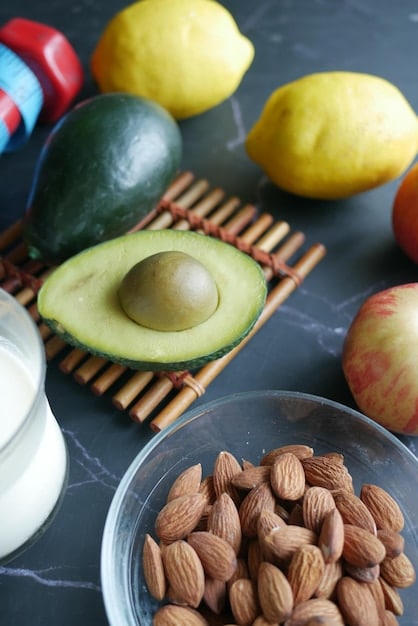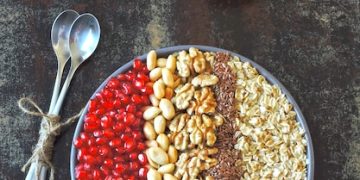Is Your Diet Stressing You Out? 5 Food Swaps for Better Mood

Is your diet contributing to your stress? Discover how your food choices may be impacting your mood and explore five simple food swaps to help reduce stress and improve your overall well-being.
Are you feeling stressed and overwhelmed? Did you know that your diet might be playing a significant role? The connection between food and mood is stronger than you might think. Let’s explore how your food choices can impact your stress levels and discover five simple food swaps that can help improve your mood and overall well-being.
Understanding the Diet-Stress Connection
The link between diet and stress is intricate. Stress can influence your eating habits, driving you towards comfort foods high in sugar and unhealthy fats. Conversely, a poor diet can exacerbate stress, creating a cycle that’s hard to break.
How Stress Affects Your Eating Habits
When you’re stressed, your body releases cortisol, a hormone that can increase appetite and cravings for high-calorie foods. This can lead to overeating, particularly of foods that provide temporary comfort but ultimately worsen your health.
The Role of Nutrients in Stress Management
Certain nutrients play a crucial role in managing stress. Magnesium, for instance, helps regulate the body’s stress response system. B vitamins are essential for nerve function and can improve your ability to cope with stress.

Here are some key nutrients to focus on:
- Magnesium: Found in leafy greens, nuts, and seeds, magnesium helps regulate cortisol levels.
- B Vitamins: Present in whole grains, eggs, and lean meats, B vitamins support nerve function and energy production.
- Omega-3 Fatty Acids: Found in fatty fish like salmon and flaxseeds, omega-3s have anti-inflammatory properties and can improve mood.
Prioritizing a nutrient-rich diet is essential for maintaining emotional balance and physical resilience.
Swap #1: Processed Snacks for Nuts and Seeds
Processed snacks are often loaded with sugar, unhealthy fats, and artificial ingredients, which can quickly lead to energy crashes and mood swings. Switching to nuts and seeds provides sustained energy and essential nutrients.
Why Nuts and Seeds Are Better
Nuts and seeds are packed with healthy fats, fiber, and protein, which help stabilize blood sugar levels and provide a steady release of energy. They also contain magnesium and zinc, both vital for stress management.
Best Nuts and Seeds for Stress Relief
Here are some top choices:
- Almonds: Rich in magnesium, almonds help regulate the body’s stress response.
- Pumpkin Seeds: A great source of zinc, which is essential for mood regulation.
- Chia Seeds: High in omega-3 fatty acids and fiber, chia seeds support brain health and stable energy levels.
By choosing nuts and seeds over processed snacks, you’re providing your body with nutrients that support both physical and mental well-being.
Swap #2: Sugary Drinks for Herbal Tea
Sugary drinks like soda and sweetened juices can cause rapid spikes and crashes in blood sugar, leading to irritability and increased stress. Herbal teas, on the other hand, offer calming benefits and help keep you hydrated.
Benefits of Herbal Tea
Herbal teas are naturally caffeine-free and contain compounds that promote relaxation and reduce anxiety. They also provide hydration, which is crucial for overall health and stress management.
Top Herbal Teas for Stress Reduction
Consider these options:
- Chamomile Tea: Known for its calming properties, chamomile tea can help reduce anxiety and improve sleep.
- Lavender Tea: Lavender has a soothing aroma and can help alleviate stress and tension.
- Peppermint Tea: Peppermint tea can ease digestive issues, which are often exacerbated by stress.
Making the switch from sugary drinks to herbal tea can significantly reduce your stress levels and improve your overall mood.

Swap #3: Refined Grains for Whole Grains
Refined grains, found in white bread, pasta, and pastries, are quickly digested and can cause blood sugar spikes and crashes. Whole grains, however, provide sustained energy and essential nutrients.
The Advantage of Whole Grains
Whole grains are rich in fiber, which slows down digestion and helps keep blood sugar levels stable. They also contain B vitamins and magnesium, both important for stress management.
Smart Whole Grain Choices
Some excellent whole grain options include:
- Oats: Oats are a great source of soluble fiber, which can help lower cholesterol and promote a sense of fullness.
- Brown Rice: Brown rice is packed with B vitamins and magnesium, supporting nerve function and energy production.
- Quinoa: A complete protein, quinoa provides all nine essential amino acids and is also a good source of fiber and minerals.
Switching to whole grains can stabilize your energy levels and improve your ability to cope with stress.
Swap #4: Fast Food for Home-Cooked Meals
Fast food is often high in unhealthy fats, sodium, and processed ingredients, which can contribute to inflammation and worsen stress. Home-cooked meals, on the other hand, allow you to control the ingredients and ensure you’re getting nutrient-rich foods.
Why Home Cooking Matters
Cooking at home gives you control over portion sizes and ingredients, allowing you to create meals that are tailored to your nutritional needs. It also provides an opportunity to incorporate stress-reducing foods and cooking can be a mindful activity that reduces stress.
Tips for Stress-Free Home Cooking
Here are some helpful tips:
- Plan Your Meals: Planning ahead can reduce the stress of figuring out what to eat each day.
- Keep It Simple: Choose recipes with minimal ingredients and straightforward instructions.
- Batch Cook: Prepare larger portions of meals that can be eaten throughout the week.
By prioritizing home-cooked meals, you can nourish your body with wholesome foods that support both physical and mental health.
Swap #5: Excessive Caffeine for Adaptogenic Herbs
While caffeine can provide a temporary energy boost, excessive intake can lead to anxiety, insomnia, and increased stress. Adaptogenic herbs, on the other hand, help the body adapt to stress and maintain balance.
How Adaptogens Work
Adaptogens are natural substances that help the body resist stressors of all kinds, whether physical, chemical, or biological. They work by modulating the body’s stress response system and promoting homeostasis.
Effective Adaptogenic Herbs
Some beneficial adaptogenic herbs include:
- Ashwagandha: Ashwagandha can help reduce anxiety and lower cortisol levels.
- Rhodiola: Rhodiola can improve cognitive function and reduce fatigue during stressful times.
- Holy Basil: Holy basil has antioxidant and anti-inflammatory properties and can help reduce stress and anxiety.
Making the switch from excessive caffeine to adaptogenic herbs can help you manage stress more effectively and improve your overall well-being.
| Key Point | Brief Description |
|---|---|
| 🍎 Diet-Stress Link | Stress impacts eating habits, worsening with poor diet choices. |
| 🥜 Nuts & Seeds | Healthier snack option with balanced energy and nutrients. |
| ☕ Herbal Tea | Calming, caffeine-free hydration to reduce anxiety. |
| 🌿 Adaptogens | Help the body adapt to stress and maintain balance. |
Frequently Asked Questions
▼
Yes, certain foods rich in nutrients like magnesium, B vitamins, and omega-3 fatty acids can help regulate the body’s stress response and improve mood.
▼
While individual results may vary, many people notice improvements in their mood and stress levels within a few weeks of making these dietary changes.
▼
Incorporating stress-reducing foods throughout the day can be beneficial, but focusing on nutrient-rich meals and snacks during stressful periods can be particularly helpful.
▼
While dietary changes can significantly impact stress levels, they are most effective when combined with other stress management techniques such as exercise, mindfulness, and adequate sleep.
▼
If you have dietary restrictions or allergies, consult with a healthcare professional or registered dietitian to find suitable alternatives that meet your nutritional needs and support stress management.
Conclusion
Making simple yet impactful food swaps can significantly reduce stress and improve your mood. By replacing processed snacks with nuts and seeds, sugary drinks with herbal tea, refined grains with whole grains, fast food with home-cooked meals, and excessive caffeine with adaptogenic herbs, you can nourish your body and mind, leading to a more balanced and stress-free life. Start incorporating these swaps today and experience the positive changes they can bring.





